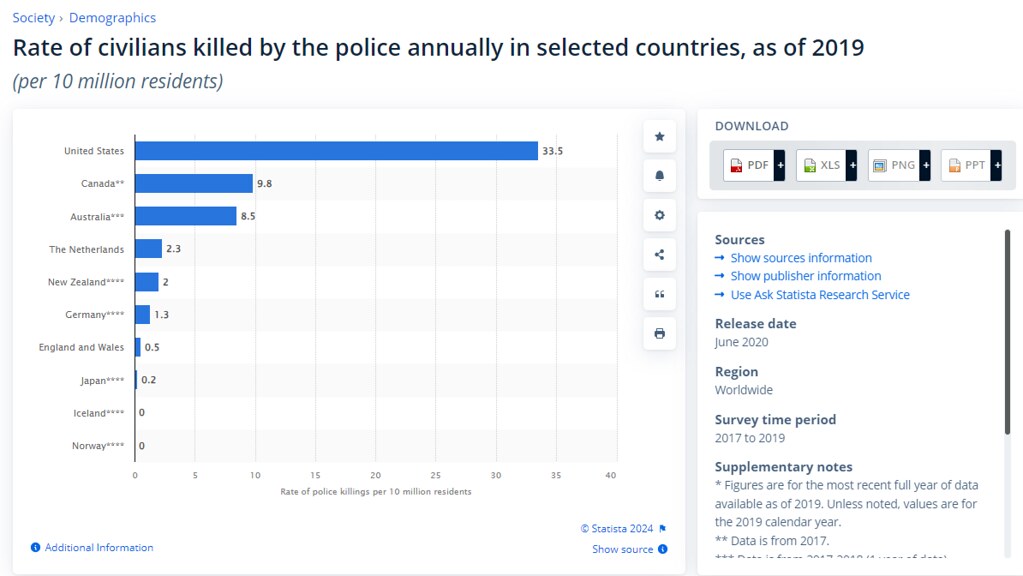Josh wrote: ↑Sun Jan 07, 2024 10:34 pm
American police are outright experts at de-escalation; using force is quite rare, in comparison to how it is in much of the rest of the world. And American citizens have a lot of rights, much more so than places like even the UK or Australia.
You are wrong about that. The US has vastly higher rates of police shootings than any peer country. Sure if you compare to places like Iran, Somalia, or Brazil you will find lots of police shootings. But developed countries that the US compares itself to? Not so much

Here is a more recent study coming to the same conclusion:
https://www.rutgers.edu/news/fatal-poli ... er-nations
Fatal Police Shootings in the United States Are Higher and Training Is More Limited Than in Other Nations
A Rutgers study delves into why police lethality in the U.S. diverges from similar countries
Police in the U.S. deal with more diverse, distressed and aggrieved populations and are involved in more incidents involving firearms, but they average only five months of classroom training – the briefest among 18 countries examined in a Rutgers study.
According to the data, the United States’ fatal police shootings rate in 2019 (3.1 per million) was five and 22 times higher than Australia’s (0.64) and France’s (0.14), respectively.
Published in the Annual Review of Criminology, the study examined the rates of fatal police violence, including shootings and other violence in 18 countries while looking at factors like the treatment of minorities, gun homicides and police training duration. Rates of gun homicides and fatal police violence were extremely closely related (.97 correlation).
That said, gun homicides may be a proxy for another explanation, such as armed and hostile suspects. For example, the study found the U.S. had a high fatal police violence rate (3.4 per million) and a high rate of gun homicide (3.7 per 100,000) while Australia had a relatively high fatal police violence rate in 2019 (.7 per million) despite low rates of gun homicide (.14 per 100,000).
Countries that exhibit high fatal police violence rates – the U.S., Venezuela, Canada, Australia, Brazil, France and Belgium – are distinguished by their mistreatment of minorities or long-standing grievances and turmoil, said Paul Hirschfield, lead author of the study and an associate professor of sociology and director of the Criminal Justice Program at Rutgers.
“The institution of slavery was so massive in Brazil and the United States that the wounds that it inflicted, the benefits it conferred and the racial hierarchy and ideology that sustained it remained long after abolition and have indelibly shaped the contemporary social and institutional order,” said Hirschfield.
According to the study, the seven countries with the highest fatal police violence – Venezuela, Brazil, the U.S., Argentina, Chile, Canada and Australia (four of which – Venezuela, Brazil, Chile, and Argentina – have recent histories of authoritarian rule) – have roots in recent colonial domination that produced some form of ethnic cleansing. The top four fatal police violence countries – Venezuela, Brazil, United States and Argentina – practiced slavery until the second half of the 19th century.
The study suggests that the amount of police training and fatal police violence outcomes are closely related.
Belgian police, with a fatal police violence rate of .35 per million, receive eight months of training, while the National Police in France, with a lower .29 per million rate of fatal police violence, attend school for ten months.
Canada, meanwhile, with a fatal police violence rate of .9 per million, provides 26 weeks of training for its national police force, the Royal Canadian Mounted Police, and 24 weeks for Toronto police, its largest municipal force.
What is taught to police during the training, and not only the duration of the training makes a difference. In Brazil and Venezuela, militarized police forces receive extended training, but fatal police violence rates are extraordinarily high, in part because training models brutal methods and generally fails to teach restraint.
Hirschfield said countries that have low fatal police violence rates despite ethnic tensions and relatively short classroom training duration (the U.K.’s England and Wales, as well as Spain), high rates of distrust in the police (Spain), secretive national police organizations with roots in dictatorships (Spain and Chile) or a relatively decentralized policing system with strong local policing (Spain and Switzerland), do exist.
The study suggests that researchers delve into these divergent cases to examine how countries such as Chile and Spain – which are beset with rising crime or insecurity, inadequate public resources and secretive national police forces with roots in dictatorships – still manage to avoid high fatal police violence rates.
Hirschfield said these are “rather fertile grounds for refining both explanations of exceptionally lethal policing in the U.S. and theories of international variation in lethal policing more broadly.”
